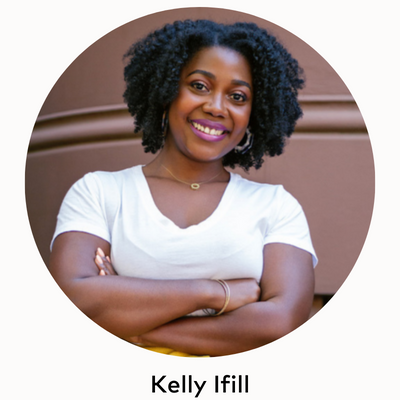Meet the woman on a mission to eliminate the racial wealth gap in banking
July 26, 2022 | By Jodi Helmer
Kelly Ifill, a former math teacher with an MBA from Columbia Business School, is hellbent on making banking work for Black entrepreneurs.
Working in venture capital after business school, she’d seen how difficult it can be for Black entrepreneurs to raise capital through the earliest rounds of fundraising known as the friends and family round, which is designed to help fledgling startups get off the ground. As the cozy term suggests, founders are expected to secure investments ranging from $10,000 to $150,000 from trusted, well-heeled contacts to serve as seed money before moving on to bigger investments from angel and institutional investors.

Yet Ifill quickly recognized why this process — long considered a startup’s first signal of success — was problematic for Black founders. “Most Black folks just don’t have that kind of access to capital to test out an idea,” she says. “It put a stark light on the issue.”
She had witnessed this issue firsthand. She grew up in Brooklyn in a family that immigrated from Trinidad, and her relatives often struggled to raise funds to grow their cleaning, contracting, landscaping and bakery businesses.
Lack of access to capital wasn’t a problem for just Black tech founders, but for the entire Black business community. And as Ifill investigated further, she realized that the problem runs even deeper. Black entrepreneurs often cannot obtain banking services, much less capital.
There are fewer banks in zip codes with higher rates of Black residents, which means that 46% of Black adults are unbanked or underbanked, making it impossible to build credit or secure a mortgage or business loans. And though they are charged higher rates, their loan applications are denied at twice the rate of white-owned businesses and experience the highest turndown rates for credit cards. These are the systemic disparities that create a significant racial wealth gap. And Ifill knew that the solution required expanding her focus beyond Black tech entrepreneurs.
So earlier this year she launched Guava, a digital community bank for Black small-business owners to help them gain access to capital and narrow the racial wealth gap.
To accomplish these goals, Ifill designed Guava to provide equitable financial products to Black entrepreneurs, offering services like checking and soon savings accounts and credit. Instead of relying on traditional models to determine creditworthiness, Guava will offer lower-barrier loans that use alternative data sets to evaluate risk.
She is pushing the boundaries of banking even further. Rather than just providing financial support, Guava also aims to help Black entrepreneurs build social capital. The Guava app connects Black entrepreneurs to one another, offering a place to talk shop and flesh out their investment networks. It also serves as a hub where Black entrepreneurs can seek out mentors and peers.
“People are particularly excited about a space where they can talk to other Black entrepreneurs, and that does not exist in the world right now,” Ifill says. “This is a space built for Black entrepreneurs by Black entrepreneurs, and people are really excited about it. That is super affirming.”
Introduced in a private beta version in January, Guava’s full rollout is planned for fall. On Tuesday, it announced the closing of a $2.4 million pre-seed round led by Heron Rock.
To navigate the complexities of operating a bank, Ifill worked with Piermont Bank to license services that allows Guava to offer FDIC-insured bank accounts, debit cards and access to ACH and wire payments that lets customers purchase inventory, process payroll and receive payments.
Earlier this month, Guava joined Mastercard Start Path In Solidarity, a startup engagement program specifically geared toward early-stage startups led by traditionally underrepresented fintech founders in the U.S., where Black-owned startups still receive less than 1% of venture capital, according to a 2021 Crunchbase report.
As with the global Start Path program for later-stage startups, the In Solidarity program, part of Mastercard’s $500 million commitment to help close the racial wealth and opportunity gap, helps fintechs scale and make the connections they need to fine-tune their products and attract investment and strategic partnerships. Ifill has big plans for the future and believes the program will help her hit those targets.
“In five years, we will want to be the standard for what it looks like to create equitable access to capital for Black entrepreneurs and to issue credit in a way that eradicates bias,” she says. “We will want to have created a place for Black entrepreneurs to gather … and celebrate their successes and support each other.”
After all, isn’t that what friends and family do for one another?